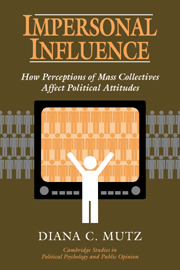Book contents
- Frontmatter
- Contents
- List of Figures
- List of Tables
- Preface
- Acknowledgments
- Part I Theory and Historical Context
- Part II Effects of Perceptions of Mass Experience
- Part III Effects of Perceptions of Mass Opinion
- 6 When Does Success Succeed? A Review of the Evidence
- 7 The Social Psychology of Impersonal Influence from Collective Opinion
- 8 The Role of Collective Opinion in Individual Judgment: Processes and Effects
- Part IV Conclusion
- Appendix: Methodology
- References
- Index
8 - The Role of Collective Opinion in Individual Judgment: Processes and Effects
Published online by Cambridge University Press: 05 June 2012
- Frontmatter
- Contents
- List of Figures
- List of Tables
- Preface
- Acknowledgments
- Part I Theory and Historical Context
- Part II Effects of Perceptions of Mass Experience
- Part III Effects of Perceptions of Mass Opinion
- 6 When Does Success Succeed? A Review of the Evidence
- 7 The Social Psychology of Impersonal Influence from Collective Opinion
- 8 The Role of Collective Opinion in Individual Judgment: Processes and Effects
- Part IV Conclusion
- Appendix: Methodology
- References
- Index
Summary
The general framework described in Chapter 7 suggests that all people may be susceptible to impersonal influence, but for fundamentally different reasons and through different underlying processes. More specifically, the very highly involved are likely to consider others' views for strategic reasons. When the moderately involved respond to perceptions of others' opinions, it is because of the strength and valence of arguments that cues about mass opinion bring to mind. And finally, for the least politically involved, information about mass opinion serves as a heuristic indicating the “correct” or most valid political choice. Following this organizational scheme, this chapter is divided into three major sections. The first two sections provide empirical evidence on the least documented mechanisms of impersonal influence on individual judgments, the cognitive response mechanism and the consensus heuristic. In the third section, I add yet another example to the burgeoning literature on contexts in which strategic uses are made of information about mass opinion. Since the strategic mechanism is strictly an explanation for behavior rather than attitude change, the last study involves an analysis of real-world political behaviors rather than measures of attitudes toward candidates or issues.
To avoid the methodological difficulties characterizing so many previous studies of the influence of perceived opinion on individual judgment, the studies addressing effects on political opinions utilized hybrid survey-experimental designs that capitalized on the control afforded by random assignment and the generalizability offered by random national survey samples.
- Type
- Chapter
- Information
- Impersonal InfluenceHow Perceptions of Mass Collectives Affect Political Attitudes, pp. 218 - 264Publisher: Cambridge University PressPrint publication year: 1998



